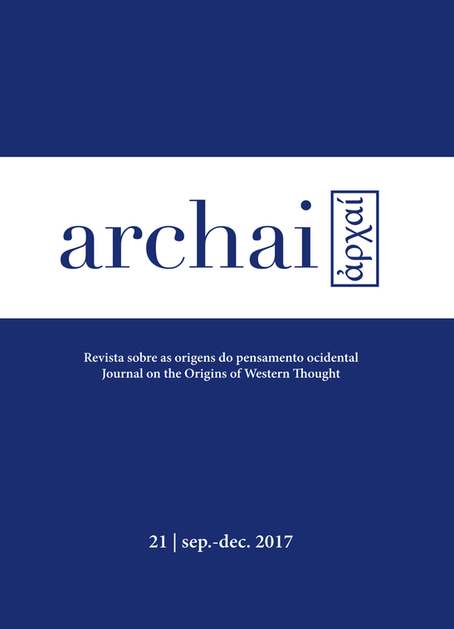The Stoic concept of phantasia
from Zeno to Chrysippu
DOI:
https://doi.org/10.14195/1984-249X_21_1Keywords:
Phantasia, Stoicism, Cleanthes, ChrysippusAbstract
In this paper we will deal with the question of the translation of the term phantasia, with closely related concepts, with the distinction between Cleanthus’ conception of phantasia and the developments made by Chrysippus.
Downloads
References
ANNAS, J. (1980). Truth and knowledge. In: BURNYEAT, M et alii (eds.). Doubt and dogmatism.
Oxford, Oxford University Press.
ANNAS, J. (1990). Stoic epistemology. In: STEPHEN, E. (ed.). Epistemology. Companions to ancient thought, vol 1. Cambridge, Cambridge University Press.
ANNAS, J. (1991). Hellenistic Philosophy of Mind. Berkeley, University of California Press.
ANNAS, J. (2003). Stoic Logic. In: INWOOD, B. (org.) The Cambridge Companion to the Stoics. Cambridge, Cambridge University Press, p.85-123.
Augustus Meineke (ed.) (1885). Estobeu. Florilegium, vol I e II (translation, introduction and notes). Lipsiae, Taubner.
BAILLY. 2000. Dictionnaire Grec-Français. Le Grand Bailly. Paris: Hachette.
BENEDICT, E; DE LACY, P. (1967). Plutarco. Moralia, Volume XIV. That Epicurus Actually Makes a Pleasant Life Impossible. Reply to Colotes in Defence of the Other Philosophers. Is “Live Unknown” a Wise
Precept? On Music. (translation, introduction and notes). Harvard, Loeb Classical Library.
BOTROS, S. (1985). Freedom, Causality, Fatalism and Early Stoic Philosophy. Phronesis 30 (3), p.274-304. https://doi.org/10.1163/156852885X00101
BRITO, R.; DINUCCI, A. “Tradução e Apresentação da Diatribe de Epicteto 1.5”. IN: Journal of Ancient philosophy, São Paulo, volume 8, n. 2, p. 116-130, 2014.
BURY R. G. (1933). Sextus Empiricus. Outlines of Pyrrhonism. (translation, introduction and notes). Harvard, Loeb Classical Library.
BURY R. G. (1935). Sextus Empiricus. Against the Logicians. (translation, introduction and notes). Harvard, Loeb Classical Library.
BURY R. G. (1949). Sextus Empiricus. Against the Professors. (translation, introduction and notes). Bury. Harvard, Loeb Classical Library.
CHERNISS, H. (1976). Plutarco. Moralia, Volume XVIII, parte 2. Stoic essays. (translation, introduction
and notes). Harvard, Loeb Classical Library.
DOBBIN, R. 1991. Î ÏοαίÏεσις in Epictetus. Ancient Philosophy 11 (1), p.111-135. https://doi.org/10.5840/ancientphil199111138
FREDE, M. (1983). Stoics and skeptics on clear and distinct impressions. In: M. BURNYEAT (ed.). Skeptic Tradition. Berkeley, University of California Press, p.65-93.
INWOOD, B.; GERSON, L. P. (1988). Hellenistic Philosophy: Introductory Readings. Indianapolis, Hackett Publishing Co.
LESSES, G. (1988). Content, Cause and Stoic Impressions. Phronesis vol. XLIII/1, p.2- 24.
LIDDELL, H; SCOTT, R; Jones, H. (1940). GreekEnglish Lexicon. Oxford, Clarendon.
LONG & SEDLEY. (1987a). Hellenistic Philosophers, vol I. Cambridge, Cambridge University Press.
LONG & SEDLEY. (1987b). Hellenistic Philosophers, vol II. Cambridge, Cambridge University Press.
LONG, A. A. (1968). The Stoic Concept of Evil. Philosophical Quarterly 18 (73), p. 329-343. https://doi.org/10.2307/2217794
LONG, A A. (1991). Representation and the self in Stoicism. In: STEPHEN EVERSON (ed.). Companions to Ancient Thought 2: Psychology. Cambridge, Cambridge University Press, p.102-120.
MODRAK, D. K. W. (1993). Stoics, Epicureans and Mental Content. Apeiron 26(2), p. 97 -108. https://doi.org/10.1515/apeiron.1993.26.2.97
NUSSBAUM, M. (1978). Aristotles’ de motu Animalium. Princeton, Princeton University Press.
HICKS, R. D.(1925). Diógenes Laércio. Lives of Eminent Philosophers, vol. I, II. (translation, introduction and notes). Harvard, Loeb Classical Library.
RACKHAM, H. (1942). Cícero. On the Orator: Book 3. On Fate. Stoic Paradoxes. Divisions of Oratory. (translation, introduction and notes). Trad. Harvard: Loeb Classical Library.
SEDLEY, D. (1993). Chrysippus on psychophysical causality. In: NUSSBAUM, M. C. (ed.). Passions and Perceptions - Studies in Hellenistic Philosophy of Mind. Cambridge, Cambridge University Press, p. 313-331.
SEDLEY, D. (2014). A definição de Zenão de phantasia kataleptike. Prometeus, n. 15, p. 147- 164.
SHIELDS, C. (1993). The Truth Evaluability of Stoic Phantasiai: Adversus Mathematicos VII 242-46. Journal of History of Philosophy, vol. 31, n° 3. https://doi.org/10.1353/hph.1993.0049
SORABJI, R. Perceptual Content in the Stoics. (1990). Phronesis, vol. XXXV/3,, p. 307-314. https://doi.org/10.1163/156852890X00213
VON ARNIM, H. (2005). Stoicorum Veterum Fragmenta Volume 1: Zeno or Zenonis Discipuli. Berlim, De Gruyter.
VON ARNIM, H. (2005). Stoicorum Veterum Fragmenta Volume 2: Chrysippi Fragmenta Logica et Physica. Berlim, De Gruyter,.
VON ARNIM, H. (2005). Stoicorum Veterum Fragmenta Volume 3: Chrysippi fragmenta moralia. Fragmenta Successorum Chrysippi. Berlim, De Gruyter.
VON ARNIM, H. (2005). Stoicorum Veterum Fragmenta Volume 4: Indeces. Berlim, De Gruyter.
WATSON, G. (1966). The stoic theory of knowledge. Belfast, Queens University Classics.
Downloads
Published
How to Cite
Issue
Section
License
Given the public access policy of the journal, the use of the published texts is free, with the obligation of recognizing the original authorship and the first publication in this journal. The authors of the published contributions are entirely and exclusively responsible for their contents.
1. The authors authorize the publication of the article in this journal.
2. The authors guarantee that the contribution is original, and take full responsibility for its content in case of impugnation by third parties.
3. The authors guarantee that the contribution is not under evaluation in another journal.
4. The authors keep the copyright and convey to the journal the right of first publication, the work being licensed under a Creative Commons Attribution License-BY.
5. The authors are allowed and stimulated to publicize and distribute their work on-line after the publication in the journal.
6. The authors of the approved works authorize the journal to distribute their content, after publication, for reproduction in content indexes, virtual libraries and similars.
7. The editors reserve the right to make adjustments to the text and to adequate the article to the editorial rules of the journal.



